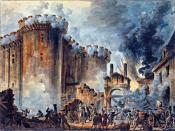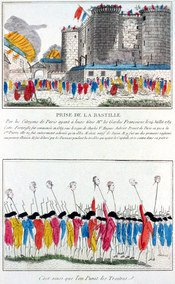The French Revolution, which lasted from 1789 to 1799, provides a classic example of how a society united to overthrow a tyrant. During this short time period, a bloody revolt by the peasant population toppled the royalty and aristocrats from power and initiated a short period in which the political system was drastically reformed. New political ideas and philosophies were introduced, many of which are still used in the modern-day political establishment. The storming of the Bastille by an angry mob of peasants began a chain of events that triggered the beginning of a whole new phase in French history. The aristocrats lost much of their power and influence, while the commoners began to have more of a say in the affairs of the nation. This illustrates how, as John Milton, Immanuel Kant, Hegal, and various other philosophers reasoned, society can actually gain and advance as a result of revolution.
The influence of the French Revolution was not only restricted to France, however. It set a precedent for various other uprisings and rebellions that exemplified how revolution is a right and perhaps even necessity of society.
In the late 1700s, French society was in a period of decay. While the wealthy nobles and aristocrats lived lavish and extravagant lives, the peasants, who made up the majority of the population, where barely able to get by. Therefore, this great divide that separated the two social classes caused resentment and envy that helped build up the tension that eventually exploded in the form of a bloody uprising. While the peasants were often put down and oppressed by the upper class, their tormentors considered it to be common practice and thought little of it. It was under these circumstances that a neglected split in society sowed the seeds for revolution.
While all...


